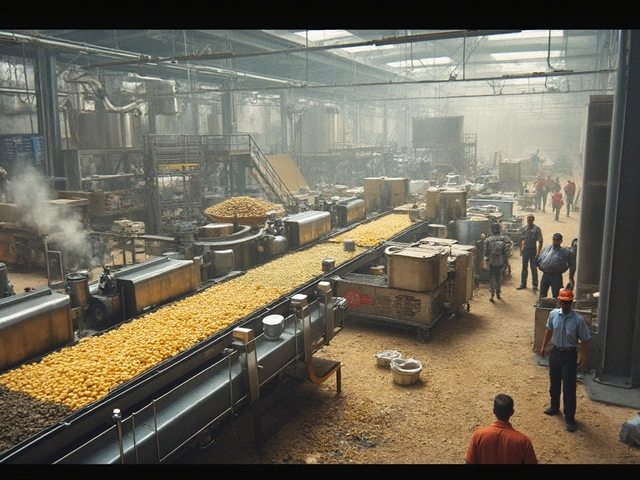Thinking about launching your small scale industry? It's quite the journey, but don't worry—it's manageable with the right steps. First up, you'll need to dive deep into understanding your chosen industry. Whether you're eyeing textiles or have a passion for new tech gadgets, knowing the ins and outs can make a world of difference.
A key factor is the equipment you'll use. Don't just opt for the cheapest or the fanciest; focus on what's genuinely necessary for your production line. Take your time to research what works best for your specific business needs. It will save you loads of hassle down the line.
Another important aspect is cost management. You need to keep a hawk's eye on your expenses and budget wisely. Remember, every penny saved is a penny earned. Look for economical yet efficient ways to source raw materials and manage logistics. These decisions can make or break your bottom line.
- Understanding Your Industry
- Choosing the Right Equipment
- Managing Costs Effectively
- Regulatory Requirements
- Building a Strong Team
- Marketing and Sales Strategy
Understanding Your Industry
Before diving headfirst into the world of small scale industry, getting a thorough grasp of your specific market is crucial. Start by researching current trends and future forecasts. What's hot right now might shift next year, and being adaptable is key.
Identify who your competitors are. This isn't just about knowing their names but understanding what they do right and where they lag. Dive into their business models, check out customer reviews, and see how they market themselves. Learn from their successes and mistakes.
Market Research
Conduct detailed market research. This involves surveys, interviews, and even scanning forums or groups related to your industry. The goal here is to understand what consumers are craving and where there might be a gap in the market that you can fill. Tailor your products or services to meet these demands.
Know Your Customers
Your business can't thrive without happy customers. Define who your ideal customer is. Are they budget-conscious teens, or maybe eco-friendly parents? The clearer this picture, the better you can craft your offerings and marketing strategies to suit their needs.
Legal and Regulatory Awareness
Understanding the legal landscape around your industry is non-negotiable. Check the specific regulations and requirements, which vary if you're in manufacturing textiles vs. electronics. This might include licenses, waste disposal mandates, or even specific health and safety codes.
Here's a small table outlining potential licenses you might need based on industry types:
| Industry | Common Licenses Required |
|---|---|
| Food Production | Food Safety License, Health Permits |
| Textiles | Environmental Clearance, Labor Compliance |
| Electronics | RoHS Certification, Safety Standards Compliance |
Remember, every industry has its quirks and quirks come with rules! Invest time in understanding these thoroughly to avoid mishaps later on.
Choosing the Right Equipment
When setting up a small scale industry, selecting the right equipment is a game-changer. Your machinery forms the backbone of your manufacturing process, so it's crucial to get this right from the start. But how do you make those choices wisely?
Understand Your Needs
First, outline the specific needs of your industry. Each business requires different tools, and understanding your production processes will help narrow down what's necessary. For instance, a food production unit might require specialized ovens and packaging machines, while a small tech startup might prioritize electronics assembly equipment.
Quality Over Cost
It's tempting to go for the cheapest options, but remember that quality matters. Investing in reliable machinery can save you money in the long run. Think of it as buying a durable car; better performance often means fewer breakdowns and maintenance costs.
Consider Flexibility
Your equipment should align not only with your current production goals but with potential future expansions. Versatile machinery that offers flexibility can adapt to new product lines or increased demand, minimizing the need for immediate upgrades.
Technology Matters
Don't shy away from integrating technology. High-tech equipment can enhance efficiency, reduce errors, and speed up production. Automation, for instance, can significantly cut labor costs and improve precision.
Environmental Impact
Increasingly, customers and regulations demand eco-friendly practices. Look for energy-efficient equipment that reduces your carbon footprint. It not only saves on utilities but also reflects positively on your brand image.
Supplier Reputation
Choosing suppliers with strong reputations ensures quality and customer support. Read reviews, ask for recommendations, and check if they offer installation and maintenance services. It's all about building a reliable partnership.
Lastly, balance your budget. Costs can escalate quickly if you're not careful. Use spreadsheets to plan and track your expenses, ensuring you get the best value for your money without compromising on quality.
Managing Costs Effectively
One of the major headaches in setting up a small scale industry is keeping tabs on costs. It's no secret that even minor overspending can put a dent in your financial plans. So, let's get straight to the point on how you can tackle this challenge head-on.
Plan Your Budget Wisely
Start with a detailed budget plan. Lay out all potential expenses, from initial setup costs to ongoing operational expenses. Don't forget to include raw materials, labor, rent, and utilities. Being thorough here will give you a clear picture of what to expect financially.
Keep Track of Expenses
Maintaining a tight grip on day-to-day expenses is crucial. Use a reliable accounting system or software. Even a simple spreadsheet can be a lifesaver in tracking where your money is going. The more organized you are, the easier it will be to spot unnecessary expenditures.
Save on Equipment
Rather than splurging on brand new machinery, consider leasing equipment or buying refurbished. These options can slash your upfront costs significantly without compromising on quality. Just do your homework to ensure you're getting a good deal.
Efficient Use of Resources
Make sure you're using resources as efficiently as possible. Minimizing waste isn't just good for the environment; it saves money too. Train your staff to be mindful of resource usage—it can make a surprisingly big difference.
Consider Your Financing Options
Don't be shy about exploring various financing options. Whether it's a small business loan or seeking out investors, having sufficient funds can prevent costly mistakes in the long run. Compare interest rates and terms to make the best choice for your business.
Negotiate with Suppliers
Buy in bulk if possible, and don't hesitate to negotiate prices with suppliers. Building a good relationship can lead to discounts and better payment terms. It's all about getting the most bang for your buck.
Managing costs effectively might be a constant balancing act, but getting it right is key to the success of your small scale manufacturing venture. Stay sharp, be proactive, and you'll navigate these waters like a pro.

Regulatory Requirements
Before diving headfirst into the world of small scale industry, getting a grip on all the regulatory requirements is super crucial. Each country has its own set of rules, so start by checking out the ones specific to your area. It may sound a bit dry, but trust me, it pays off to know your stuff here.
Business Registration
First things first, you'll need to register your business. This isn't just a nice-to-have; it protects your business name and sets you up legally to start trading. Usually, this involves choosing your business structure—like a sole proprietorship or a limited company—and then getting registered with the appropriate government agencies.
Permits and Licenses
Depending on your industry, you might need various permits or licenses. For example, food manufacturers often require health and safety permits due to the nature of their products. Similarly, sectors like electronics might need environmental clearances due to e-waste concerns. Do your homework to figure out what's needed for your specific field to avoid nasty surprises later.
Tax Compliance
Next up is tax compliance. Registering for the right taxes—like VAT or income tax—is vital. This gets a bit complex, so keeping a financial advisor in your corner might be a smart move. They can help make sure you're compliant with the tax man, avoiding any future headaches.
Employment Laws
If you're planning to hire a team, you also need to comply with employment laws. This covers everything from setting fair wages, to ensuring workplace safety, and managing employee benefits. It's all about creating a responsible and compliant working environment.
Stay Updated
Lastly, regulatory landscapes can shift over time. Set up a system to stay informed about changes or updates in regulations that might affect your business operations. Joining industry groups or forums can be helpful for keeping your head around it all.
Tackling these regulatory requirements might feel like a chore, but they are essential stepping stones to making sure your small scale industry runs smoothly and avoids pitfalls.
Building a Strong Team
So you're ready to roll, but who’s going to help you get there? Building a small scale industry isn't a solo gig—it’s all about having the right people by your side. Let's break it down and see how you can put together a dream team for your burgeoning business.
Identify Key Roles
First things first, you need to sketch out which roles are essential for your operation. Do you need skilled labor for production? What about someone to handle cost management or oversee sales? Identifying these roles early on can prevent costly oversights down the line. Here’s a simple way to approach this:
- Production Staff: Crucial for the actual making of your products.
- Quality Control: Ensures your products meet high standards.
- Sales & Marketing: Gets your product out there and drives sales.
- Financial Officer: Keeps track of the finances, helping with budget planning.
Recruitment Tips
Finding the right people can be tricky, but there are a few strategies to make it easier. Post job listings on niche industry platforms, attend job fairs, and consider referrals from industry colleagues—they're often a goldmine for reliable candidates.
Foster a Positive Work Environment
A motivated team is a productive team. Encourage an open culture where feedback is welcomed and innovation is applauded. Regular team meetings and open-door policies can help foster such an environment.
| Role | Average Salary (GBP) |
|---|---|
| Production Worker | 18,000 - 25,000 |
| Quality Controller | 20,000 - 28,000 |
| Sales and Marketing Manager | 30,000 - 45,000 |
| Financial Officer | 25,000 - 35,000 |
Training and Development
Invest in your team’s skills. Regular training sessions not only improve efficiency but can also boost overall morale. Whether it's a workshop on new production techniques or a seminar on effective sales strategies, it's all about empowering your team to grow and succeed alongside your manufacturing business.
Marketing and Sales Strategy
Nailing your marketing and sales strategy is absolutely crucial for your small scale industry. Why? Well, it's all about grabbing the attention of your target audience and converting that interest into real sales.
Identify Your Target Audience
Before anything else, figure out who your products are for. Are you aiming at tech-savvy millennials or maybe eco-conscious parents? Knowing your audience helps tailor your approach and ensures you're hitting the right notes.
Craft Your Unique Selling Proposition (USP)
What's your product's standout feature? Why should someone choose yours over others? Make sure your USP is clear and part of every marketing message you put out there. This sets you apart in a crowded market.
Embrace Digital Marketing
In today's world, having a strong online presence isn't optional—it's necessary. Utilize social media platforms like Instagram, Facebook, and even TikTok to reach out to your potential customers. Share engaging content that showcases your product and your brand story.
Leverage Content Marketing
Consider setting up a blog or YouTube channel related to your small scale industry. Share insights, tutorials, or behind-the-scenes glimpses. It builds trust and a community around your brand.
Effective Pricing Strategy
Pricing can make a big difference in your sales. Research your competitors and ensure your pricing is competitive while still allowing for a healthy profit margin. Remember, quality should match the price point.
Build Partnerships
Collaborate with other brands where it complements both parties. It can boost visibility and lend credibility to your small business. Be selective and ensure partnerships align with your brand's ethos.
Monitor and Adapt
Track your marketing activities and analyze what works and what doesn’t. It's all trial and error, and flexibility is key. Adjust your strategy based on customer feedback and sales data.
So, there you have it! With these strategies, you're on the right path to making your small scale industry a success. Keep it dynamic, keep it engaging, and most importantly, keep it real!










Write a comment